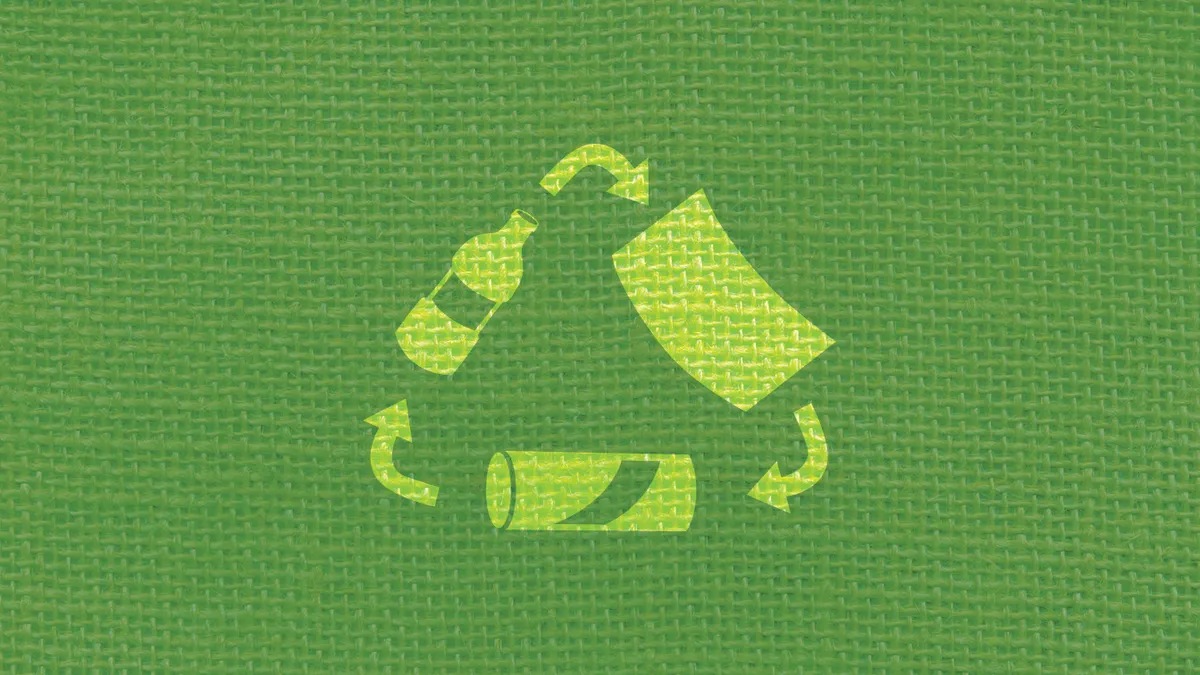UPDATE: Oct. 14, 2019: Gov. Gavin Newsom has vetoed AB 792, citing concerns about administrative burden for state regulators and a lack of accountability for plastics manufacturers.
“While I support strong minimum recycled content standards, late amendments to this bill would result in a costly, burdensome process that undermines the worthy intent of this legislation," Newsom wrote in a Oct. 12 veto message.
Newsom pledged to revisit the concept as part of broader changes to the struggling California Beverage Container Recycling Program. He did sign AB 54, a law intended to provide short-term relief to participating recyclers. This concludes an especially busy legislative session for California recycling issues.
Dive Brief:
- The Circular Economy and Pollution Reduction Act (SB 54/AB 1080) never made it to a vote before California's state legislature concluded its 2019 session early Saturday morning. The bills would have required manufacturers to reduce waste from single-use packaging by 75%, and also required such packaging to be recyclable or compostable, by 2030.
- Ongoing opposition by trade associations representing the manufacturing and materials sector were among the roadblocks, per CalMatters and the Los Angeles Times. Lead sponsors Sen. Ben Allen and Assemblywoman Lorena Gonzalez are expected to revive the legislation in January 2020.
- Lawmakers did send at least one high-profile recycling bill (AB 792, sponsored by Assemblyman Phil Ting) to Gov. Gavin Newsom before adjourning. If signed into law, this will require beverage containers to be made with 50% recycled content by 2030.
Dive Insight:
California continues to be hit hard by the downturn in global commodity markets – due to its location, high recycling targets and other factors – so the state's 2019 legislation season was a particularly busy one for waste issues.
Bills intended to improve recycling education, market development and existing product stewardship programs were also approved and now await Newsom's signature.
AB 792 could set a particularly notable standard that may help drive domestic recycling markets – if companies don't opt to pay financial penalties instead. After originally calling for 100% recycled content by 2030 – a mark that companies such as Nestle Waters North America opposed, but have also said is achievable in specific instances – the bill's aims are now somewhat more modest. Plastic beverage containers covered under the bottle bill would have to include at least 10% post-consumer recycled content by 2021, and 25% by 2025, before the 50% target takes effect in 2030.
In addition to AB 792, Ting also got a bill through that could provide short-term relief from California's expanding bottle bill crisis. If signed, AB 54 will put $5 million toward grants for a mobile recycling pilot and also pause fines for grocery retailers that don't offer container redemption service.
Following the abrupt summer closure of rePlanet, the state's largest redemption center operator, this issue will likely require a bigger fix again next year.
By essentially rewriting the way consumer packaging was designed and recycled, supporters of SB 54/AB 1080 saw their plan as one way to eventually address the bottle bill issue. A final amendment last week shifted container manufacturers out of the bottle bill's financial requirements by 2026.
Other key amendments included lighter penalties for manufacturers that didn't meet the 2030 target and an expanded scope of materials beyond just plastics. These changes did successfully shift many large opponents to either supportive or neutral, but also stirred up issues with others such as the Glass Packaging Institute.
In the end, the Grocery Manufacturers Association, Plastics Industry Association, Waste Management and others remained opposed.
Common concerns included a lack of details about new infrastructure funding, the potential for state officials to have too much latitude in creating regulations and a general fear of losing control under an extended producer responsibility system. The latter criticism was among the most pressing factors for the recycling industry, though large companies such as Republic Services and Recology were still supportive.
Given how far the two bills got this session, and California's penchant for shifting the perception of what's possible when it comes to environmental regulation, this packaging debate isn't over.















